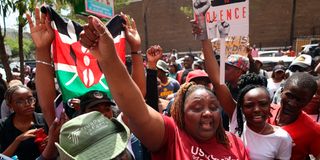14 women raped during June 25 anniversary protests, rights groups say

Usikimye founder Njeri Migwi in an anti-femicide march in Nairobi on December 10, 2024. She says some of the rape victims are suicidal
What you need to know:
- Thirteen victims reached out to Usikimye, an agency that supports survivors of sexual violence.
- Ten attacks were registered in Nairobi, two in Ngong and a case in Nakuru.
At least 14 women were raped during the anti-government protests on Wednesday, according to rights organisations.
Thirteen victims reached out to Usikimye, an agency that supports survivors of sexual violence.
Of those, eleven were gang-raped by three to 11 men.
Ten attacks were registered in Nairobi, two in Ngong and a case in Nakuru. Fida-Kenya confirmed an additional case in Nyeri.
Usikimye Executive Director, Njeri Migwi, said she has received calls from the survivors and offered psycho-social support.
She said the women talked of being ambushed by gangs, some armed, dragged off motorbikes, raped and robbed.
“Some of the survivors didn’t even have their phones. They called using borrowed ones. One university student used her room-mate’s phone. Another was too afraid to leave her house,” Ms Migwi said.
With no therapists immediately available, she and her team provided psychological first aid, medical help and temporary safety.
“One victims is suicidal. A man stood by a woman on the street until I arrived,” she said, adding that the survivors are not willing to report the assaults to authorities.
“They feel they will not get justice and support from police. Even convincing them to go to hospital has been a struggle,” she said.
The Usikimye founder said fear has paralysed the victims, with many not willing t leave home.
“There’s fear for their safety. What if it happens again? What if those men recognise me? What if the neighbours can tell?” she added.
Contacted, the National Police Service (NPS) said it is aware of the claims but has not received formal complaints.
NPS spokesperson, Muchiri Nyaga, said: “We are still trying to collect data.”
Asked about a social media post showing a man bragging about rape, he said: “Sometimes you’re ahead of us. If it’s on social media, send screenshots. But there has to be someone who says she was raped. That is how the process begins.”
Mr Muchiri added that for any official action to be taken, rape victims must record statements with police.
“We have advised stations to provide such data. Until then, we cannot act on hearsay,” he said.
In a national address on Thursday, Interior Cabinet Secretary Kipchumba Murkomen described the protests as “terrorism disguised as dissent”.
“There was no peaceful demonstration. We condemn the anarchists who, in the name of peaceful protests, unleashed a wave of violence, looting, sexual assault and destruction on our people,” the minister said.
For survivors like those supported by Ms Migwi, the trauma is far from over.
“The world is upside down but we can try to tilt it a bit so it doesn’t feel completely devastating. These women need to know it’s not their fault. They deserve to feel safe,” Ms Migwi told the Sunday Nation.
Ms Eva Komba, a Gender and Development expert, said it is the duty of the government to protect demonstrators, including women.
She said the sexual abuse may have been a targeted attack to scare women from taking part in future protests.
“Young women have become the face of the protests. They are vocal and some people may not be happy,” she said.
Mr Crispin Afifu, a gender specialist, said Kenyans can take precautions to reduce the risk of sexual assaults during street demonstrations.
“Be in trusted groups that share their locations in real time with family or friends, avoid isolated routes and know where help can be accessed quickly, such as hospitals, emergency contacts or other safe spaces,” Mr Afifu told the Sunday Nation.



